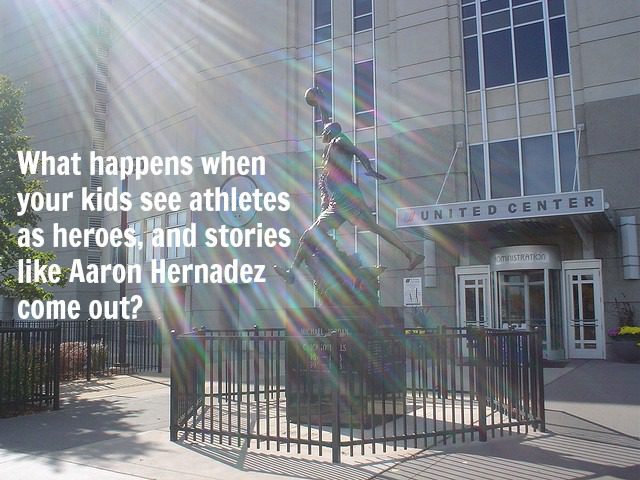Michael Jordan, Ozzie Smith, Tony Dorsett, Emmitt Smith, and Julius Erving. These were some of my favorite athletes when I was a kid. They were heroes to me.
I wanted to “Be Like Mike”
I followed everything they did. I wanted to play like them, I wanted to be like them, I wanted to dress like them and I wanted to do what they did. I sang right along with the Gatorade commercial, Be Like Mike. So, when I see news like Aaron Hernandez, or (insert random athlete name with legal troubles) it cuts me deep because I know there is some kid out there who viewed Hernandez like I did Mike, or Tony Dorsett, or Ozzie. The news is probably shocking, confusing, and heart breaking.
News travels fast today, especially bad news
My kids and their generation live in a world where the good and bad of every athlete is shared in real time and in detail. Unfortunately, as much good as there is, it seems there is as much bad, if not more. So what happens when your kid’s favorite player is Aaron Hernandez, or an “Aaron Hernandez?” What do you say to your kids? What do you say to the players on the youth team you coach?
What are your kids learning from you?
You are reading the CoachUp blog, so you probably love sports like me. And like me you probably get very emotional when watching sports. You cheer your favorite teams on and feel great when they win, and probably feel terrible when they lose. And like me your kids are probably watching you through it all. They are probably doing what you do.
You are their most influential role model
As you watch sports with your kids, coach youth teams, and talk to them about sports, keep in mind you are very influential as their parent or coach. You may not have a Super Bowl ring, MVP trophy, or lead the league in touchdowns, but what you say and do impacts what your kids and players say and do. So when you put an athlete on a pedestal, even unintentionally, your kids and players will believe it is okay to do so. Just the same when you trash talk an athlete, they will feel that is what you do. Make sure you keep sports in the proper perspective, no matter how much you love a sport, or team. Below are 3 things to consider when talking to your kids about Aaron Hernandez, and trying to keep sports in proper perspective.
1) Focus on character and values not stats, wins, or rings
Yes, your kid’s favorite player may have the purest jump shot you have ever seen. Or have a bigger clutch gene than Michael Jordan, Kirk Gibson, and Eli Manning put together, but their character and what they value weighs more than it all. Unfortunately, you may never really know what an athlete values or what his/her character is. So, when evaluating athletes they want to be like, help them understand emulating their game is great, but be careful of wanting to emulate them in every area of their life. Especially the areas they have no knowledge of.
2) Take responsibility because mess ups will happen
You mess up, your kids mess up, their friends and teammates mess up. Everybody messes up, on and off the field, this includes their favorite athlete. Emphasize this to your kids, and also emphasize the importance of taking responsibility once you mess up. Whether that is missing the cut-off man, or missing the garbage man and having stinky garbage for an extra week. Don’t give the impression that athletes are perfect in all areas, even if they seem to be in their sport. Look for teaching opportunities of athletes and people who’ve messed up, and taken responsibility. Taking responsibility when you make a mistake is something to look up to.
3) Know what makes a true hero
Talk about true heroes. Find examples of true heroes in the news, in history books, in your own life. True heroes have strong character, take responsibility, but most of all they are selfless. A true hero does for those who can’t do for themselves. First responders in the Boston Marathon bombing were real heroes. Firemen and policemen who rushed to the Twin Towers on 9/11 are true heroes. When your kids see true heroes they are less likely to put athletes in that light.
Be proactive beats being reactive
I’ll be honest, this was one of the hardest posts I’ve written. There is no easy way to talk to your kids after their sports “hero” has been accused of taking another person’s life or helping someone else do it. Or when he/she has failed a drug test, or anything along those lines. Your best defense is a good offense. Emphasizing the points above as part of your regular parenting, coaching, and mentoring will help you better handle situations like this if they come up in the future. You can then refer back to what you’ve already taught them.
Now is better than never
If you have not talked to them in the past about these things, or your actions have lead them to think putting an athlete on a pedestal, or in the “trash,” there is no better time than now to begin those conversations.
Question: Have you had to have a difficult conversation with your kids or players about an athlete who has been involved in something like this? Jackie Bledsoe, Jr. is a sports parent of three and writes on sports parenting. He has played sports for over 30 years, including the collegiate level, and coached youth sports for the past eight years.
How useful was this post?
Click on a star to rate it!
Average rating 0 / 5. Vote count: 0
No votes so far! Be the first to rate this post.


